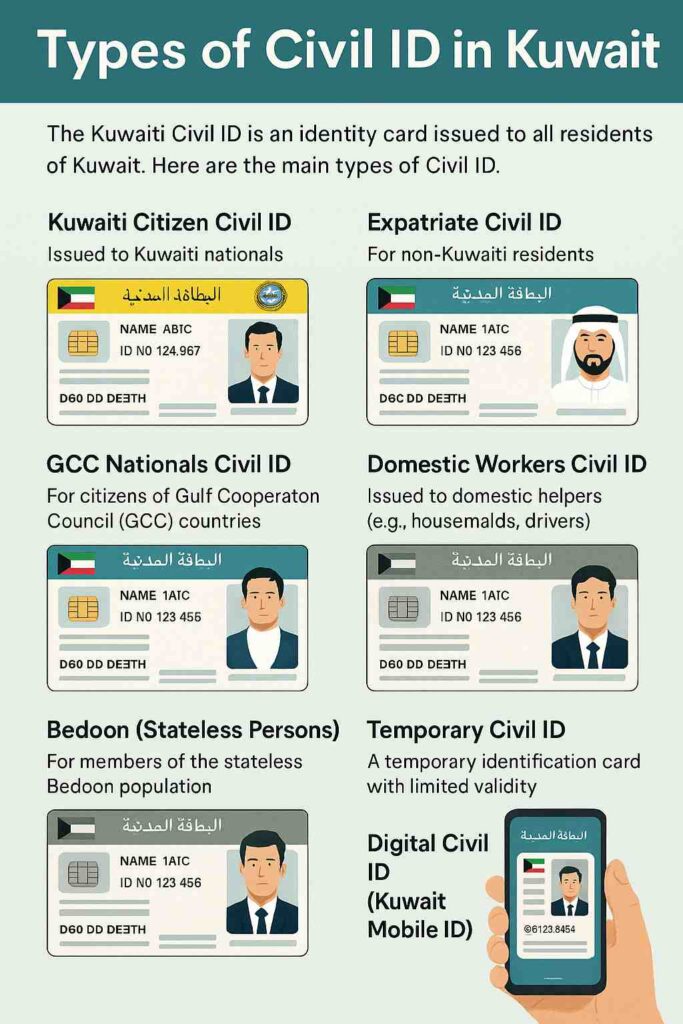How Many Types of Civil ID in Kuwait?
In Kuwait, a Civil ID is more than just an identification card; it’s your official proof of identity, residency, and legal status, and checking the validity of Kuwait PACI ID is essential for accessing government and private services. But not everyone gets the same type of Civil ID. Depending on whether you’re a citizen, expat, or a temporary resident, Kuwait issues different types of Civil IDs. This guide focuses only on explaining the various types of Civil IDs in Kuwait in a clear, direct, and easy-to-understand way.
Types of Civil ID in Kuwait?
Kuwait issues 7 main types of Civil IDs:
Kuwaiti Citizen Civil ID
Expatriate Civil ID
GCC Nationals Civil ID
Domestic Workers Civil ID
Bedoon (Stateless Persons) Civil ID
Temporary Civil ID
Digital Civil ID (Kuwait Mobile ID)
Each type serves a specific purpose based on your residency status. Further, people can check their online civil ID status.

Kuwaiti Citizen Civil ID
This ID is issued to Kuwaiti nationals only.
Features a yellow top
Information in both Arabic and English
Grants full access to government services
Validity: Up to 10 years (5 years if under 18).
Expatriate Civil ID
Designed for non-Kuwaiti residents living and working in Kuwait.
Typically blue or green in color
Includes residency visa details
Validity: 1–2 years
Must be renewed alongside the residency permit.
GCC Nationals Civil ID
This is for citizens of Gulf Cooperation Council countries (Saudi Arabia, UAE, Qatar, Bahrain, and Oman).
Similar to expatriate ID
Marked specifically for “GCC National”
Easier application process than standard expats
Domestic Workers Civil ID
Issued to individuals working as domestic helpers, such as:
Housemaids
Drivers
Cleaners
Includes employer (sponsor) details and is typically valid for 1 year.
Bedoon (Stateless Persons) Civil ID
For individuals classified as stateless residents (Bedoon).
Grey-colored card.
Indicates “Bedoon” status.
Comes with limited rights and services compared to citizens and expats.
Temporary Civil ID
Issued when a permanent Civil ID is being processed or delayed.
Short-term validity (3–6 months).
Used during visa processing or renewals.
Not accepted for all services.
Digital Civil ID (Kuwait Mobile ID)
A digital version of your physical Civil ID, accessible via a mobile app.
Known as Kuwait Mobile ID
Accepted for most transactions.
Easy to download and use.
Does not replace the physical card but complements it.
Quick Comparison Table
| Civil ID Type | Eligibility | Validity | Key Features |
|---|---|---|---|
| Kuwaiti Citizen ID | Kuwaiti Nationals | Up to 10 yrs | Full access to services |
| Expatriate ID | Foreign Residents | 1–2 yrs | Linked to a residency permit |
| GCC Nationals ID | GCC Citizens | Varies | Simplified process |
| Domestic Workers ID | Helpers (maids, drivers) | 1 yr | Includes employer details |
| Bedoon Civil ID | Stateless Persons | Varies | Limited rights |
| Temporary Civil ID | Pending permanent ID | 3–6 months | For processing periods |
| Digital Mobile ID | All eligible residents | N/A | App-based digital ID |
Which Type of Civil ID Do You Need?
Here’s a quick guide:
Kuwaiti? → Kuwaiti Citizen ID
Foreign resident? → Expatriate ID
From a GCC country? → GCC National ID
Working as a helper? → Domestic Workers ID
Stateless? → Bedoon Civil ID
Temporary stay? → Temporary Civil ID
Want digital convenience? → Download Kuwait Mobile ID
Knowing which type of Civil ID applies to you is essential for living legally and comfortably in Kuwait. Whether you’re a citizen, expat, or temporary resident, keeping your Civil ID valid and updated ensures smooth access to services and avoids legal issues.